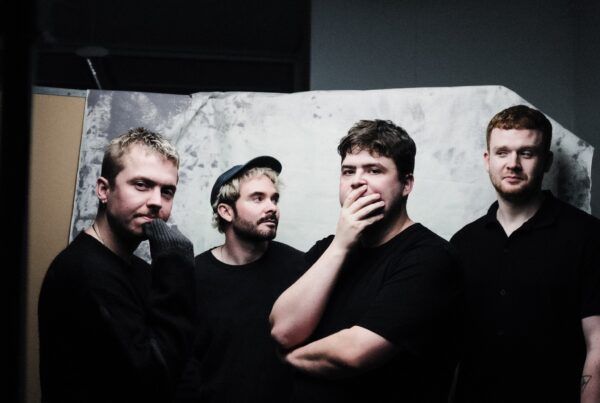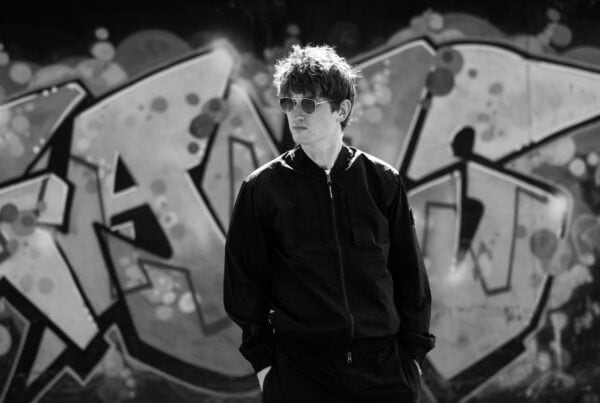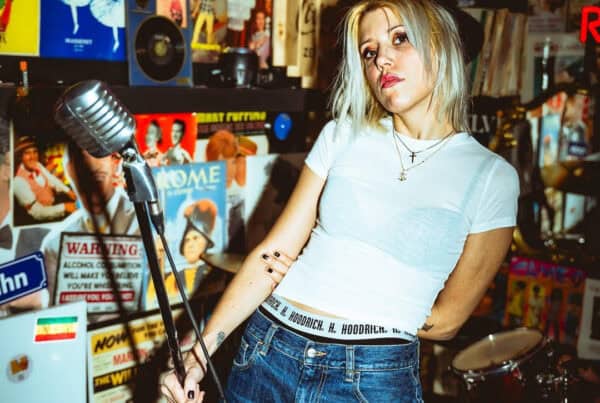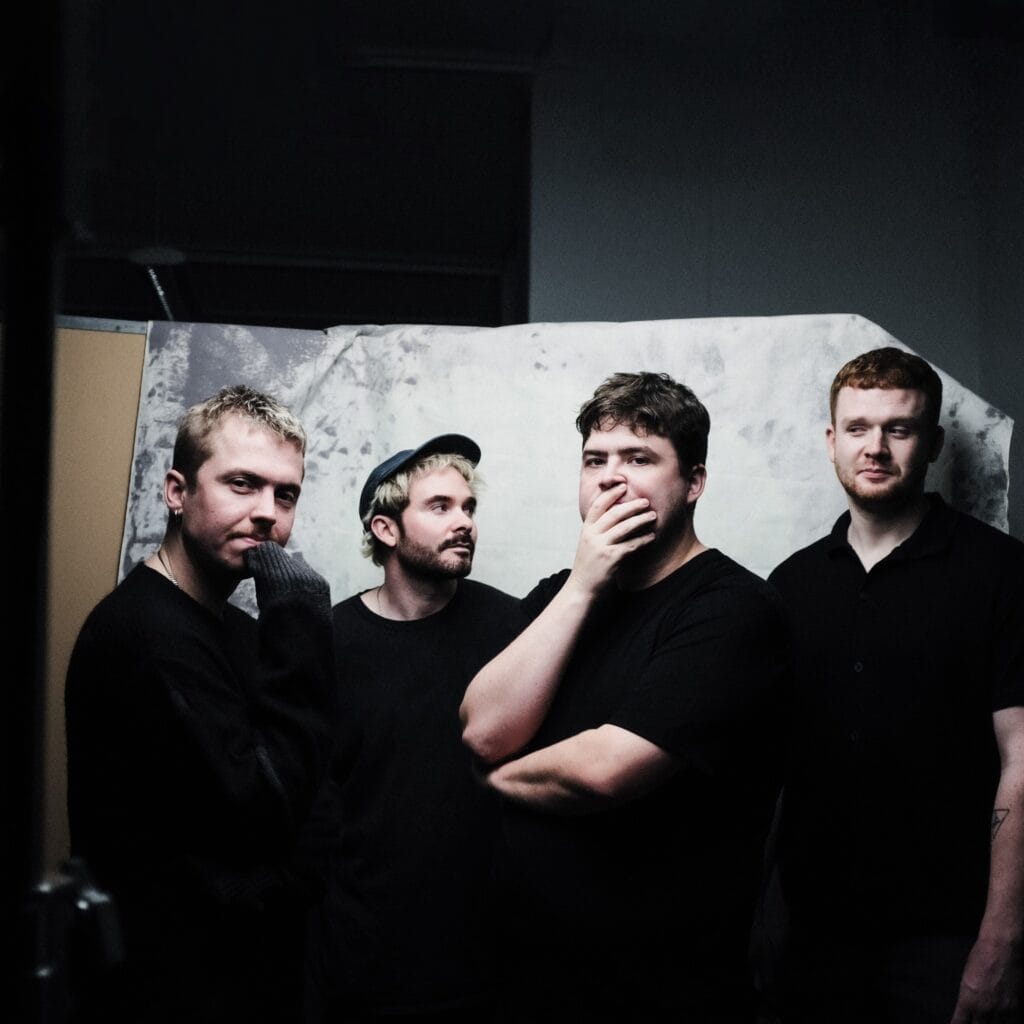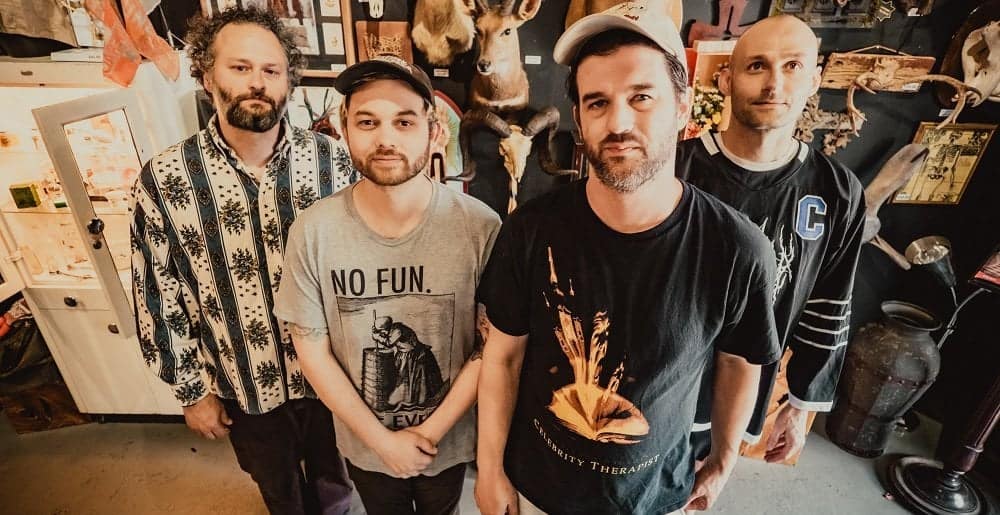Words: Callie Petch
It’s just gone 7PM on a sunny Tuesday evening and Tom McGreevy of Ducks Ltd. is sat on a bench outside of Leeds’ Ship Inn when he breaks mid-flow to point to the pub’s speaker. The Communards “Never Can Say Goodbye” is blasting out behind our chat. He beams, “this is a fucking banger you never hear in the US!” before half-rhetorically asking why Hi-NRG never caught on that side of the pond. Whilst the likelihood of a sharp third album pivot into Stock-Aitkin-Waterman Casio chintz remains low for now, McGreevy’s love for that particular 80s pop genre isn’t entirely a surprise given how Ducks Ltd. similarly operate in the realm of maximal, hook-driven, super-energetic and bright bursts of poppy goodness. The key difference of course being that, whereas Hi-NRG acts worshipped cheap keyboards and presets, McGreevy and creative partner Evan Lewis instead worship Telecasters, The Chilis, and early R.E.M.
OK, that’s admittedly a tortured stretch for a comparison. Ducks Ltd. make fast, breezy, straight-to-the-pleasure-centres guitar music whose speeding-highway sonics mask lyrics concerning environmental decay, failed relationships, and mental isolation. Yet, said darkness almost never overwhelms the music, playing into the jangle pop lineage of making that despair seem manageable through danceable melodies and cathartic riffs played with energy. Lines like “here’s me thinking that this might have been an all-time low, but you’re right to point out that I’ve always been a dumbass” reflect real sincere anxiety whilst still being self-aware enough to have a little fun with those emotions.
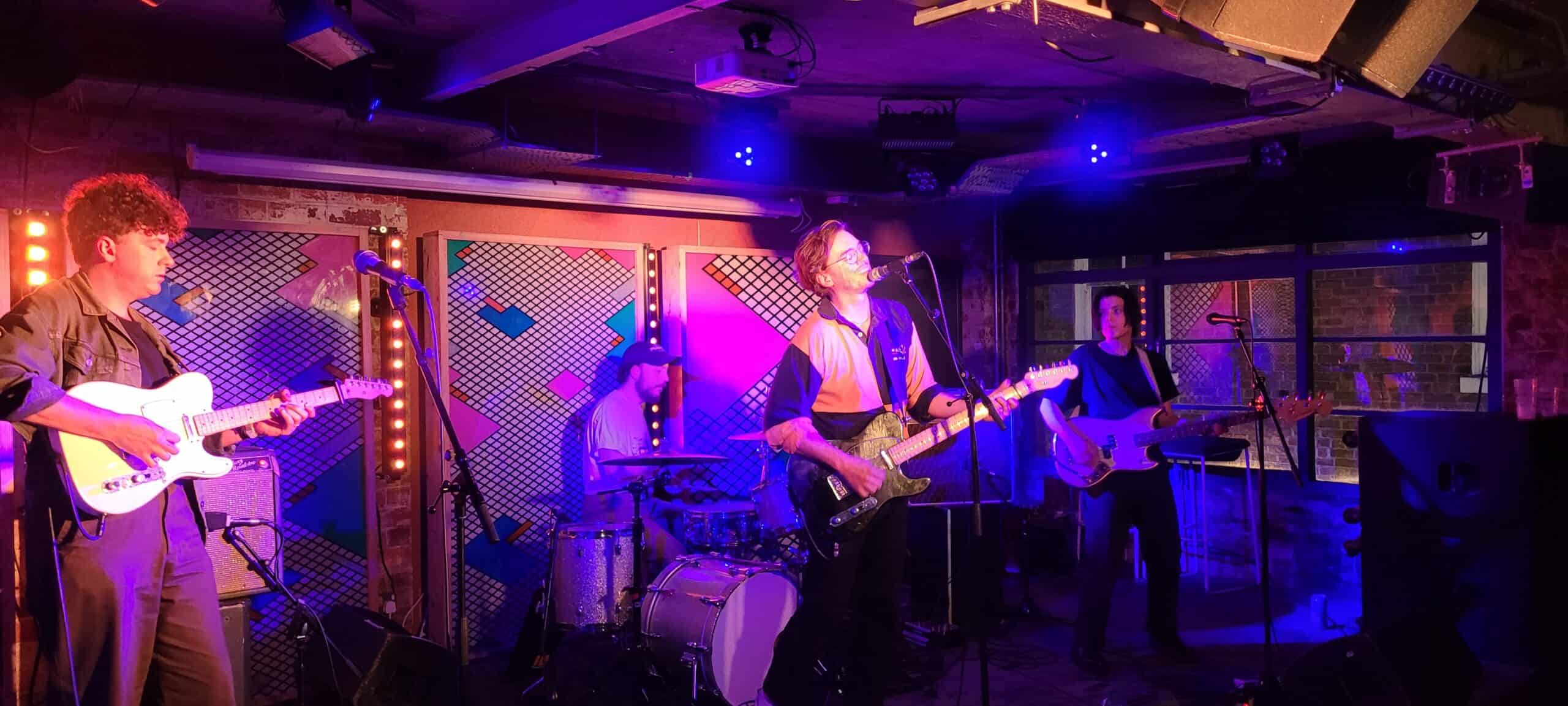
Photo by Callie Petch.
McGreevy is aware of his lot in life – after telling him that I first got into Ducks Ltd. on their 2022 tour with illuminati hotties and Momma, he cheerily quips “that’s the last time Momma will ever open for us,” referring to their sudden ascent shortly after. But he’s also fully comfortable in himself and the music he makes with Lewis. Harm’s Way is a concise and tightly-packed 9-song, 27-minute sprint of a record; “perfect for a commute,” he notes. It’s one of my favourite albums of the year so far, refining the raw guitar-pop thrills of debut Modern Fiction with more textured production and potent hooks, and he lights up when I tell him this. Whilst resolutely trying to avoid overthinking any part of their success or process, he’s also more than happy to go long about Toronto civic planning and nerd out about guitars. He half-jokes that the band could probably squeeze their entire released discography so far into a 35-minute set, then they proceed to do almost exactly that a few hours later when taking the stage at Headrow House; speeding up these songs even faster until they resemble lost The Only Ones classics.
In so many words, he’s a delight to talk with and a guy whom it’s very easy to relax around (something that’s hard to do for me with my Asperger’s). Below, we discuss how a year of relentless touring inspired Harm’s Way, working with an outside producer for the first time, the songs left on the cutting room floor, and trying to verbalise what exactly makes a “Ducks song.”
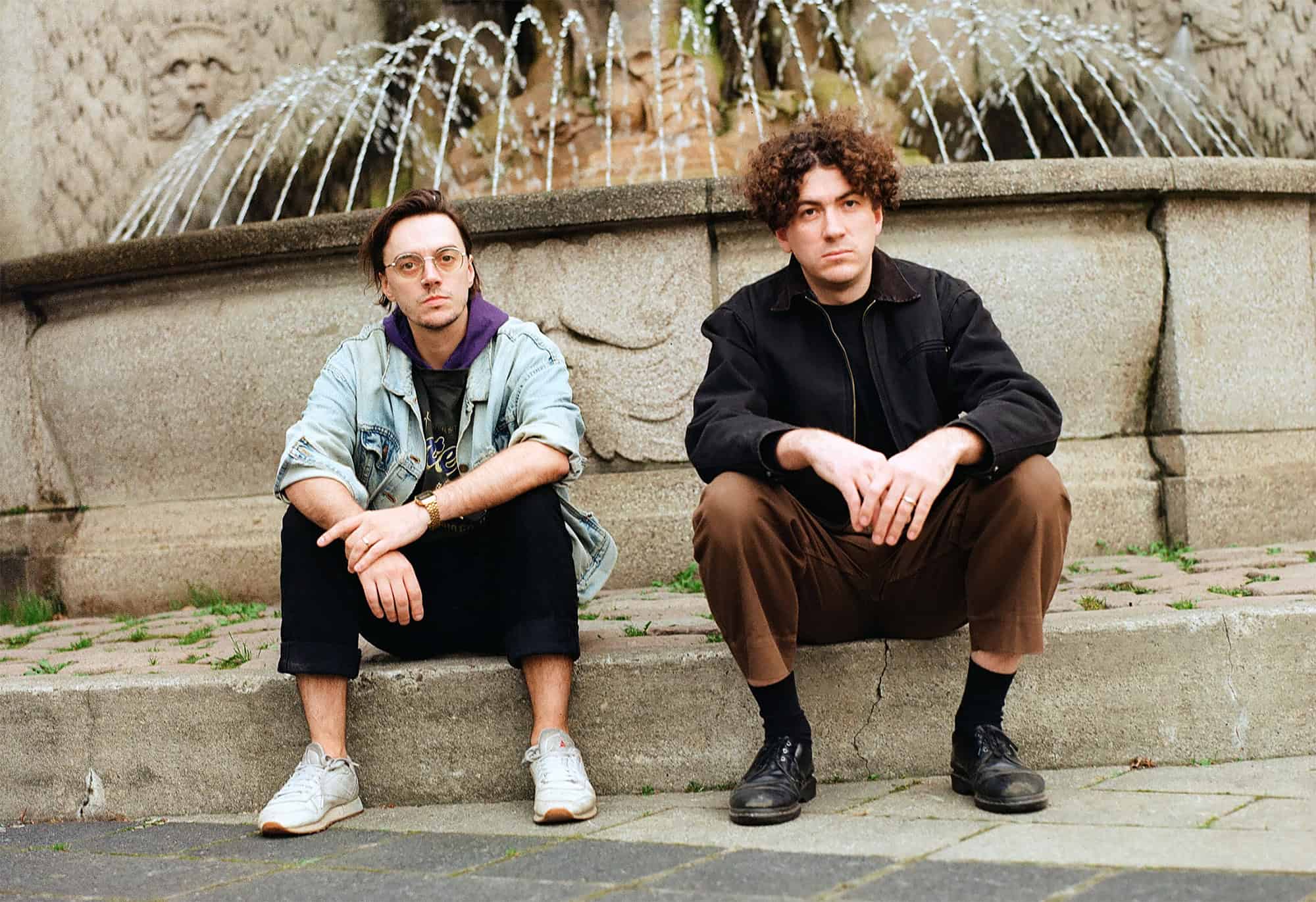
Credit: Dylan Taylor.
This interview has been lightly edited for flow and clarity.
How you doing so far?
No complaints! We never played Liverpool before last night at Kazimier, that was really cool. There always seems to be a few more people in the room than there were last time, which is always a nice feeling.
You’ve mentioned in interviews that Modern Fiction was more of an insular record whereas Harm’s Way seems to be more of an outward record. Was that something which came about naturally from writing on the road?
A lot of it in this country, actually. Some of Harm’s Way was written on the road, some was written inspired by the road. When we were writing the first record, I was writing from a lot of my experiences, and they were experiences based around being in my house. Whereas this time, the experiences were being out in the world and meeting new people. It was more outward in that sense, but it also explores social bonds and responsibilities a little bit.
Although you have stated that it’s not intentionally political in that way.
I don’t think I’m quite good enough to write direct political songs! *laugh* Maybe one day! But it is less aiming to be that and more just reflecting the context of now, I think.
How did you and Evan [Lewis] change your approach to writing songs from Modern Fiction, if at all?
It wasn’t dissimilar. Mechanically, we still wrote this album the same way, in the same basement even. But I think it was different in the back-end. Instead of finishing a song’s particular thought in that area, we went to Chicago worked with producer Dave Vettraino, we worked with some of our friends, and that was were things evolved from before. We found a few different gears from that process.
I was going to ask what it was like to work with Dave. Your previous releases were all self-produced…
Dave’s really, really good at what he does. He’s an unbelievable engineer; without question, the best one I’ve ever been around. But he’s also really musical guy. He understands very quickly and intuitively what you’re trying to do, and he understands why music works when it works. It never felt like he was pushing us in any direction, but he’d figure out what we were trying to do before we could even articulate it.
Bringing somebody in from outside the circle to give a fresh perspective.
To some extent. That was more on textures and stuff. A lot of it was sort of technical. He’s a very musical guy with a very technical understanding and that combination of traits is quite rare. In this instance, it helped us move forward with the record in a way I don’t think we would’ve managed exactly on our own.
It’s interesting you bring up the technical side because I feel like, whilst both albums operate in similar sonic areas, Harm’s Way is a less aggressive listen? Modern Fiction often felt like it was pummelling for attention, but here there’s a lot more space in the mixing and the vibe is a bit softer and more confident in the nuts and bolts.
Yeah, I think that’s a thing. Our tendency is to be very maximalist. We learned from Dave, and a bit on our own, that “more” doesn’t necessarily make something impactful. Being able to pull back is just as good.
You’ve mentioned before that you used to write songs and then only figure out how to play them live later on, which would kick up its own troubles for the live band. Is that still a thing?
*laughs* There are a couple of songs on the record we did do with a live band before finalising. But we’ve found out that our own process is comparatively weird and insular. For us, when things exist in a live sphere for too long, they tend to, in slow and imperceptible ways, track away from being a thing that’s good to hear into being a thing that’s fun to play. It happens slowly but becomes death by a thousand cuts, having strayed really far from the initial idea without realising you’ve done it. Staying in the box during the writing process, for that reason, is really important to us.
Do you feel the songs are evolving on-stage from where they were when you wrote them?
I don’t know. They probably are, but in ways I’m not aware of. I think we have pretty distinct ideas on what we want the live band to be and what we want the record to be; what we like to hear when we go see a band, is different from what we want to hear when we listen to a record. This band is both of those things even though they’re quite different from each other. Live, we’re punky and louder and play everything a little bit faster, probably a little less nuance and a little more power to it.
How have you found touring as a live band for this album compared to Modern Fiction?
It’s fun to have more songs to choose from. The more songs you have, the more songs that are… good. *laughs* I’ve noticed that when a band gets to their third or fourth album, they can put together a set where every song’s a single. We’re not quite there yet, but it’s cool to get closer to it! We had a really nice run with Ratboys in the US which helped us figure this stuff out a bit and now we’re feeling pretty confident.
Speaking of, Julia [Steiner, singer/guitarist of Ratboys] did some guest harmonies on a few songs on the album, plus new single “When You’re Outside,” along with people from Dehd and Wildhoney. What made you decide to get them involved?
They’re a mix of people we knew before and people we just liked. We were in Chicago and just hit everyone up to come to the studio for an evening to try some stuff out. Dave only admitted afterwards, cos that’s the kind of guy he is, that “[he] wasn’t sure if that would work, but it did!” Julia and Margaret McCarthy [Moontype] have beautiful singing voices and are amazingly-talented musicians with a lot of knowledge I don’t about arranging vocals and how harmonies could work. It was a fun silly night of working on stuff, and we got some really good pizza!
Why Chicago to record?
Basically, a bunch of bands we currently like were based there and slowly realised that the same guy, Dave, was working on all their records. The experience of making our first album wasn’t particularly distinct because it was done in this COVID grind-zone where one day rode into another. So, the idea of going somewhere and making the experience part of the creative process was very appealing. And that did truly happen! Dave’s got this beautiful studio where we did all the vocals looking out of this huge window at the Chicago skyline. We did a couple of vocal days where I’d be standing there watching the sun go down over the skyline through this warehouse window! That’s a really nice sensation to put into the songs, whether or not you can hear the difference.
On the chorus to “When You’re Outside,” your vocals are pushed into a much higher register than you typically have on-record…
Yeah, our songs don’t get to let me do that that often! It’s certainly the highest I’ve ever sung on a Ducks record.
Have you performed it live yet?
We haven’t! One day, maybe! I promise I can do it! *laughs*
Was there a particular reason why the song got left off the album?
I think it didn’t quite fit in the running order for whatever reason. We’ve got a couple other songs we liked but felt didn’t fit the record or thematically overlapped, and we want to put them out at some point. There’s one in particular that I’m really excited for people to hear cos we’ve recorded it twice for both albums and both times it didn’t quite fit! It’s a slightly different kind of Ducks song that we haven’t written since our first EP.
Are you guys in the habit of holding back songs which don’t fit for later revisitation?
Kind of. When stuff doesn’t make it onto an album… some of that just isn’t very good. *laughs* But some of it is because it just doesn’t quite fit, and those are the most interesting to go back to. This particular song, which I’m not naming, we recorded for the first album and the only reason why it didn’t make the cut was cos we didn’t think we quite nailed it. So, we went back and nailed it this time… but it doesn’t fit the second album! *laughs* We approach making records by coming in with as much music as we can so that there is stuff to discard, and the record can be just the best bits.
In the jangle pop tradition, the music is often very upbeat and bouncy but the lyrics are quite dark and prone to despair. Opener “Hollowed Out” uses a sinkhole as a metaphor but it’s inspired by an actual sinkhole?
Yeah! It is both literally about a sinkhole and then, if not a metaphor, resonant imagery to associate with a suite of feelings on the world and how it is. A lot of the streets in Toronto run north and south down to the lake, they used to be rivers that got built over and are particularly vulnerable to collapsing into sinkholes, which kinda felt like nature reclaiming this urban environment. When this one near Dundas opened up, it took them over six weeks to fix and it became a part of daily life living in that neighbourhood, navigating around this encumbrance. Inevitably, it became a thing I was thinking about a lot.
I feel like that dichotomy of upbeat music and downbeat lyricism hits its critical point on closer “Heavy Bag,” where the defeated sentiment of the lyrics wrests control of the music into something minor. You’ve mentioned before that you put it at the end cos you didn’t feel you could bring the mood back up, but was there a risk of it not making the album at all?
When we started working on “Heavy Bag,” we didn’t know if it was a Ducks song or not. When we got the demo finished, we knew we’d made it work, but it took a lot longer than our other songs cos it involved us reversing our own instincts. Not doing what we always do, feeling out a little bit of a different process, a different way of filling and not filling space. So, there was a period of time where we were unsure of whether it’d make the record. But when it came together, it was exciting finding out what else a Ducks song could be. “When You’re Outside” was a similar one, a slight change to the formula and structure, which is an exciting thing to discover. For most of the time this band has existed, we’ve been trying to refine our core sound, tighten it and figure out how to do it in the best possible way. In the middle of this album, it felt like we’d gotten it its essence! And that moment was when we switched to “ok, what else can this be?”
What do you think makes a “Ducks song,” or is that something you try not to overthink?
Yeah, that’s the thing. I think we’ve got a pretty good sense of what sounds like us, we know when we’re playing what sounds like the kind of thing we’d do. *laughs* Me and Evan have a very matching vision of what these songs should be and how they should work. Finding our way to that is our process of making this music.
How do you guys get that specific jangle tone on your guitars?
A few different things. If there’s one secret weapon, it’s this pedal called the Jangle Box. It’s a compressor that’s supposed to mimic what The Byrds used. Also, a deep abiding commitment to Fender guitars, and specifically Telecasters. There are other guitars on the record but, at the end of the day, it’s a Telecaster more often than it isn’t. We’ve gotten kind of insane about it; I own two of the same Telecaster! Electric guitars, they got ‘em right the first time!
What are you currently listening to?
I’ve been on tour the last couple of weeks, so I feel like my listening hasn’t been my own but rather whatever’s on in the van! Our friend Rui Gabriel has a new album coming out that I’ve been listening to, also on Carpark Records, but that’s about it solo-wise.
What’s been on in the van, then?
Evan’s on this big Beach Boys kick. I would say the earlier stuff is better than the later stuff, but I’m not sure Evan would agree with me! *laughs*

